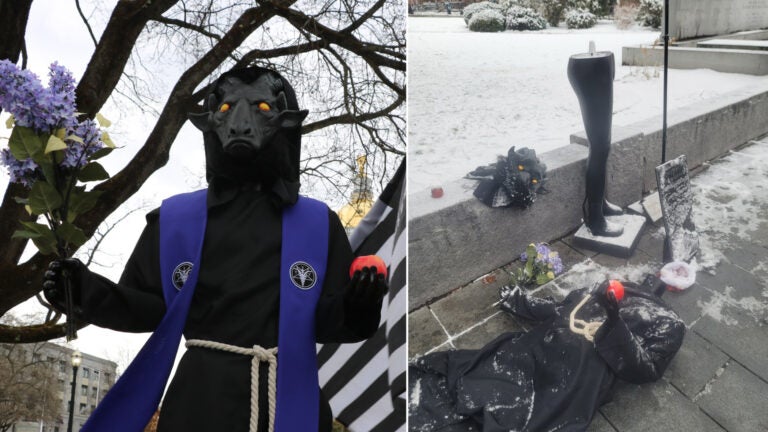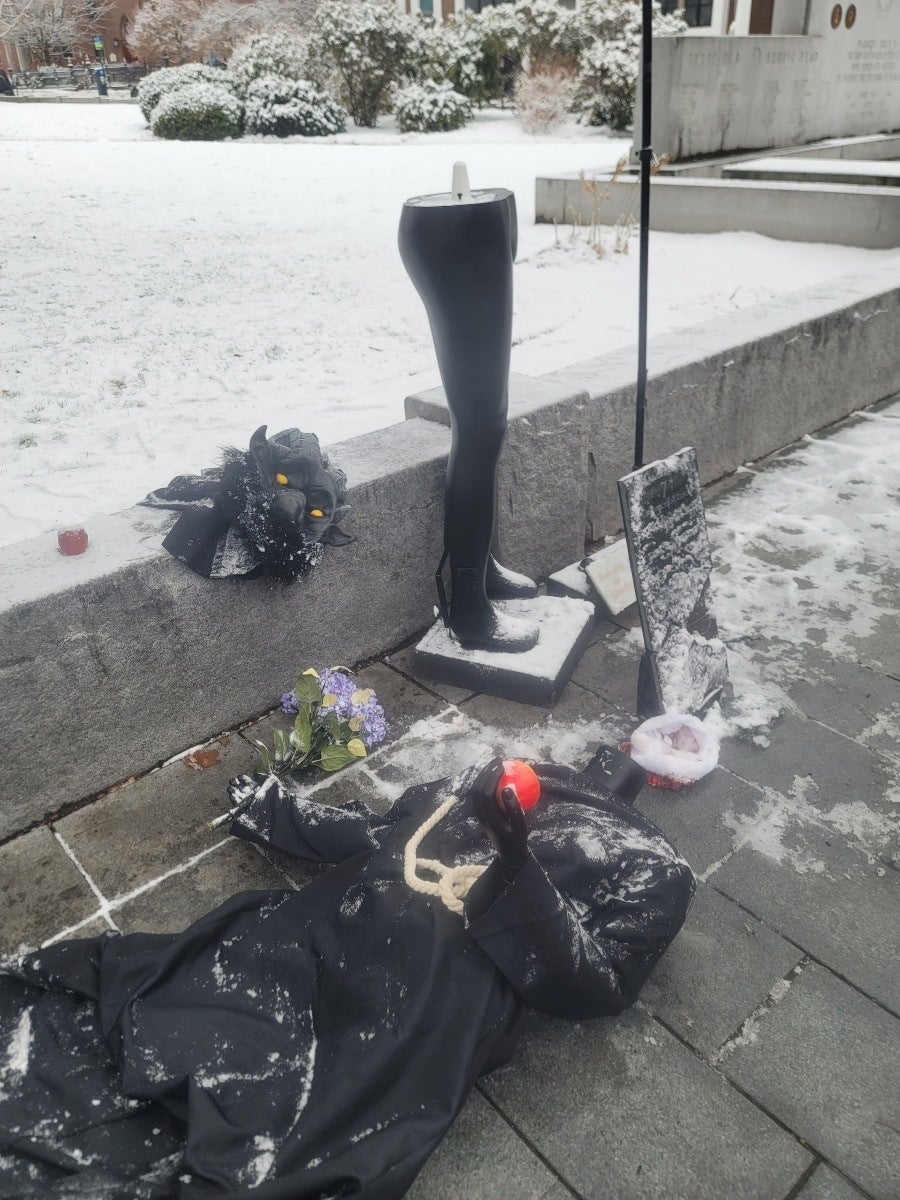Boston.com Today
Sign up to receive the latest headlines in your inbox each morning.

Local News
Since the Satanic Temple’s monument near Concord, New Hampshire’s Nativity scene was unveiled Saturday, it has been “completely destroyed,” a state representative said.
The Salem, Mass.-based Satanic Temple, or TST, received a permit to place their monument of Baphomet, a deity and occult symbol with yellow eyes, near the city’s Nativity scene by the Statehouse. The city said in a statement they approved the permit in part “to avoid litigation.”
TST representatives unveiled Baphomet on Saturday night, and police believe it was vandalized some time between early Sunday morning and Monday afternoon. In pictures provided to Boston.com, only the legs of the black mannequin remained upright, while the strewn head and torso were damaged.
A spokesperson for Concord police confirmed that they responded to the scene Monday and could be investigating the incident as a hate crime.
State Rep. Ellen Read, a Democrat from Newmarket, initially asked TST to join the scene to represent “our pluralistic society.” She isn’t officially involved with them or the design of the Baphomet monument, but has signed up as a member online.

“I’ve just been a long time supporter of TST in terms of their beliefs and the work that they do,” Read said. “I’m local, so I helped with the permitting process, and I was there for the unveiling.”
Read said the monument had already been toppled once right after the unveiling ceremony on Saturday. Within 48 hours, the tablet listing the TST’s seven fundamental tenets had also been cracked with chunks of text missing.
Read said by Monday night, Baphomet had been taken apart and the tablet smashed. She said a Santa hat and a Christmas ornament had been left at the scene.
The display was cleaned up and removed Tuesday after the vandalism, Read said.
“There was nothing inherently offensive about the display. There were accusations that it meant to denigrate Christians, but there was nothing about it that was denigrating Christians,” Read said. “If you don’t want to allow it for all religions, then you don’t have to allow religious displays.”
Concord Mayor Byron Champlin previously said he would appoint a committee to evaluate the city’s options to regulate unattended displays for the future.
Champlin was critical of the display. He didn’t reply to a request for comment regarding the vandalism, but said at a Monday night meeting his preference was to oppose TST’s permit.
“I oppose the permit because I believe the request was made not in the interest of promoting religious equity but in order to drive an anti-religious political agenda and because I don’t respond well to legal extortion, threat of litigation,” Champlin said.
Read said it’s a First Amendment concern.
“They can pretend that they allow it for all religious displays, but it’s only really applicable if it’s Christianity,” Read said. “That’s kind of the point of calling that out and making sure that we’re standing up for First Amendment principles.”
TST did not return multiple requests for comment.
Sign up to receive the latest headlines in your inbox each morning.


A former New Hampshire State Police trooper who got caught using his personal cellphone to exchange text messages with people who had been arrested should have his name included on the state’s list of law enforcement officers with known credibility issues, the New Hampshire Supreme Court said in an order Tuesday.
The trooper, who is identified only as John Doe, had arrested a woman then contacted her later that night so she could retrieve a purse she had left in the back of his cruiser, according to court records.
When confronted by his supervisor in June 2018, the trooper said he had never done that before, but the supervisor later learned the trooper had a lengthy text exchange with a different arrestee in May 2018, according to the records.
An internal investigation concluded the trooper had been untruthful. He was fired, and his name was added to the Exculpatory Evidence Schedule, formerly known as the Laurie List, which prosecutors use to keep track of officers whose employment files contain information that may need to be disclosed to criminal defendants.
The trooper filed a lawsuit in 2021 arguing that his name should be removed from the list because the records at issue in this case didn’t constitute “potentially exculpatory” evidence. But the trial court dismissed his claims, ruling that he had lied during the course of an official investigation and should be on the list.
The trial court denied the trooper’s motion for reconsideration in 2022, and the Supreme Court’s 4-0 order on Tuesday affirmed that denial.
The trooper claimed he had forgotten about the May 2018 text messages due to a disability, so he wasn’t actually lying when he told his supervisor in June 2018 that he hadn’t texted others previously. And he claimed he had falsely admitted to being untruthful because his military training taught him to accept responsibility when confronted by superiors.
But the justices ruled this is the sort of situation that belongs on the Exculpatory Evidence Schedule, even if the trooper’s false testimony was unintentional.
“Regardless of the justifications offered by the plaintiff, his conduct warrants inclusion on the EES because it reflects on his ‘general credibility,’” they ruled, noting that a criminal defendant could feasibly use this incident in a future case to question his trustworthiness.
This ruling was the latest in a series from the New Hampshire Supreme Court as the justices grapple with a cresting wave of litigation over which types of conduct warrant placement on the list and which do not.
Since the court released decisions in September and October that help to clarify application of the relevant statutes, the justices have issued six additional orders in John Doe cases from across the state.
Most of the recent rulings, but not all, have gone in favor of the officers challenging their placements on the list. The justices ruled last week, for example, that a trooper who lied to a tribunal about an email should remain on the list.
That case and Tuesday’s ruling highlight the reason the EES exists: If an officer was previously caught providing false information in an official proceeding, then prosecutors may need to disclose that to criminal defendants. The list is a tool to help ensure that happens.
This story first appeared in Globe NH | Morning Report, our free newsletter focused on the news you need to know about New Hampshire, including great coverage from the Boston Globe and links to interesting articles from other places. If you’d like to receive it via e-mail Monday through Friday, you can sign up here.
Steven Porter can be reached at steven.porter@globe.com. Follow him @reporterporter.



Rassemblement National’s Jordan Bardella threatens to bring down French government
Freedom is permanent for Missourian described as the longest-held wrongly incarcerated woman in US


Struggling to hear TV dialogue? Try these simple fixes


OpenAI's controversial Sora is finally launching today. Will it truly disrupt Hollywood?


Brussels denies knowledge of Reynders's alleged money laundering


All raw milk from Fresno dairy farm will be cleared from store shelves; cows have bird flu


Read Representative Jerrold Nadler’s Letter


Oklahoma measure seeks to make school district superintendents an elected position